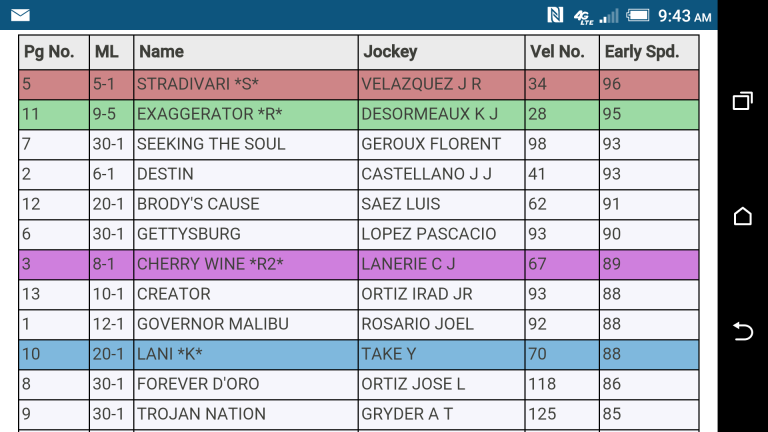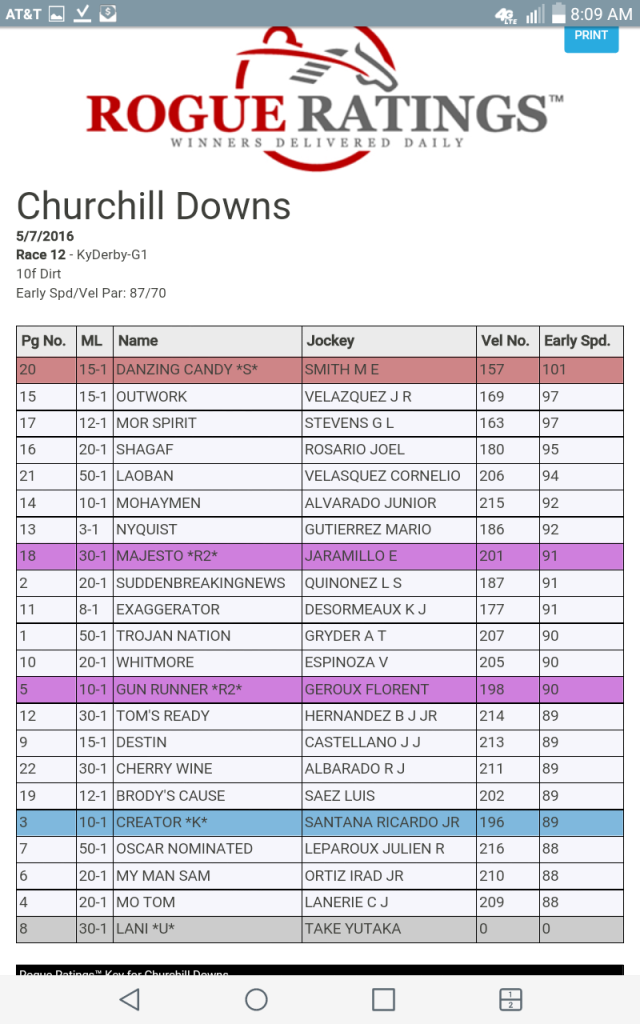The solid fractions set during the running of the 148th Belmont Stakes yesterday and the big late closing move of Lani to finish third helped to once again prove the effectiveness of the Rogue Ratings™ computer program for giving the new fan, novice horseplayer or even the seasoned gambler a big leg up on the competition at the track.
These actual early fractions set in the 148th Belmont Stakes of 1/4 in 24 and the 1/2 in 48.2, which did help to set up the Belmont Stakes for a closer (off the pace horse) like #10-Lani to use his reserve energy to close in the stretch drive as the early front runners were used too much in the early going of the race and had little to nothing left for the stretch drive.
Remember, what the Rogue Handicapper® analysis of the Rogue Ratings™ computer program for the 148th Belmont Stakes was yesterday?
Well, here is what the Rogue Handicapper® analysis of the Rogue Ratings™ said again, which was yesterday:
Number #5-Stradivari and #11-Exaggerator hold a considerably advantage over the rest of the field on a Velocity # stand point which may very well be too much for the other horses to overcome, but the disadvantage to these two horse and others that look to be on the early pace of this race is that if the fractions do become too fast and contested between a few of these horse then it would definitely play into the hands and set-up nicely for #3-Cherry Wine and #10-Lani!
Also, know that because we can’t predict every race correct all the time must be chalked up to the factor know as “racing luck” (horse stumbling, jockey misjudging the pace and 101 other things that can happen in a race), which is a strong factor in racing and does exert it’s influence on many if not most races and the best we are looking for in betting the horses and being a winning horseplayer is a program that consistently shows us (1) how a race looks to develop and (2) which horses to bet on and the Rogue Ratings™ computer program does this consistently!
The Rogue Ratings™ computer program does quickly summarize the Race Shape of any race to help you understand what horses look to run early and if there is a good possibility of a contested early pace or not that lets you know specifically what type of Race Shape that looks to develop in any race.
The Rogue Ratings computer program has three basic and simple types of Race Shapes scenarios to analyze how the race looks to develop and which horse or horses look to be at advantage:
- Lone Speed Horse (Race Shape) a single horse controlling the pace of the race (an early speed difference) that favors the horse which is said to be “loose on the lead” as this type of Race Shape helps to save the horses’ reserve energy for the stretch drive.
- Multiple Speed Horses (Race Shape) usually is when two, three or more horses are vying for the early lead in a race which presents a Race Shape that sets up to be run with fast or solid early fractions that hurts these early runners chances as they are not allowed to settle in during the early part of the race and are required to use more energy early which favors the off the pace horse such as the Rogue Horse, R2 Horse or Key Horses. As these types of projected plays are usually reserved early in the race and can better use their reserve energy for their mid-race or late run.
- Normal (Race Shape) is where the pace of the race really doesn’t look to set up for any particular Race Shape scenario or to favor any particular horse as the race looks to be run with honest early fractions, which should result in the race coming down to who is the better horse or horses in the race based on the Rogue Ratings™ projected selections, which are in listed colors and symbols.
The final question is which horse do you play? And that answer is very easy to know when you use the Rogue Ratings™ computer program as it spells it all out for you in simple highlighted colors and symbols as to which horses to play.
Here is a key box for understanding these horses:
 The Rogue Ratings analysis of the 148th Belmont Stakes shows four potential plays by the computer program for the bettor to focus on, which are in Early Speed or Race Shape order (how the race is projected to run from the early going and later stages of the race):
The Rogue Ratings analysis of the 148th Belmont Stakes shows four potential plays by the computer program for the bettor to focus on, which are in Early Speed or Race Shape order (how the race is projected to run from the early going and later stages of the race):





Follow RogueHandicapper